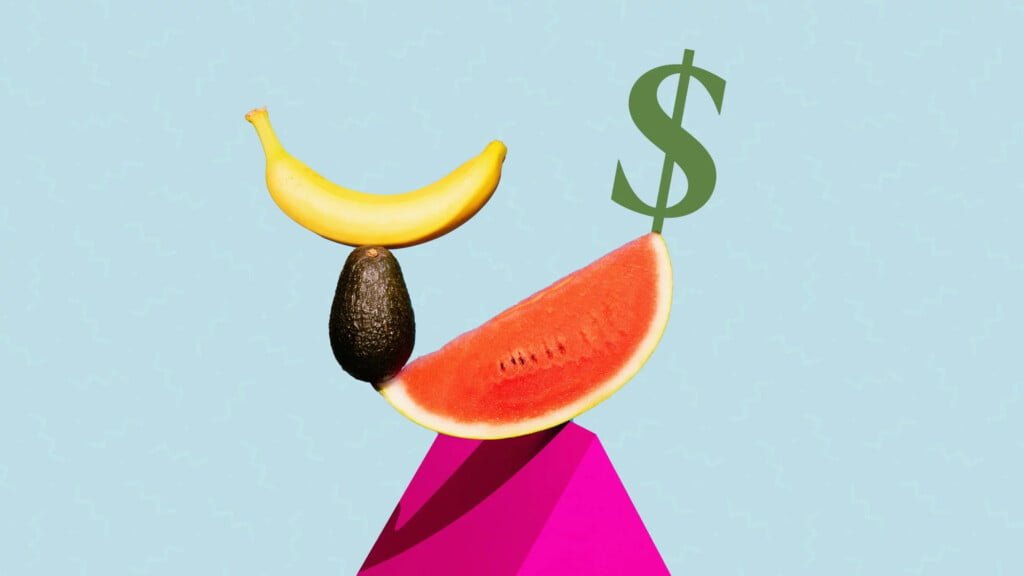
The key to a healthy mind and body is good nutrition. Expert advice on how to eat healthy on a budget.
Contrary to popular belief, eating well does not have to be expensive. The Harvard T.H. Chan School of Public Health found in 2013 that the healthiest diets only cost $1.50 more per day than the unhealthiest.
In Seattle-based meditation and wellness teacher Heather Adams’ words, “healthy food doesn’t have to be more expensive.” “Non-pre-cut fruits and vegetables are cheaper than processed foods.”
The $1.50 difference may not seem significant, but it can add up for those struggling with hunger. Many low-income families still lack access to healthy foods. A June USDA study found that 88 percent of SNAP recipients had difficulty accessing a healthy diet. The most common reason (62%) was the cost of healthy food.
While universal access to nutritious food is desired, here are some ways to eat healthy on a budget.
Make your own meals
Cooking at home is a great way to eat healthier and save money. Rather than buying pre-made healthy foods, get the ingredients and make them yourself. Making healthy food staples like salad dressing or granola is a great way to save money and time.
The Posh Pescatarian chef Stephanie Harris-Uyidi says making these at home with fresh ingredients is “an easy way not only to save money but also to eat healthier versions of your favorite convenience foods.” Prepare your own high-protein snacks instead of reaching for the chips.
A visit to your local farmers
Shop at your local farmers’ market for seasonal produce. A farmers’ market is the best place to find out what’s in season and what’s not. Supporting local farmers saves you money at the grocery store, says Jamie Hickey, RD, a certified trainer and registered dietician.
Harris-Uyidi says farmers’ markets save money because farmers sell directly to customers, bypassing shipping agents, retailers, and other middlemen. So you get fresh produce and support local farmers.
One more? Don’t waste your produce and use it all up. “One head of cabbage can serve up to ten meals depending on how you use it,” Adams says. So you don’t get sick of your veggies, she suggests getting creative. Smoothies can be made with any un-used fruits or vegetables that are close to spoiling.
Buying in bulk and sticking to store brands
Buy in bulk, especially foods that can be frozen or have a long shelf life. Buying healthy foods in bulk saves time and money. Also, buying generic or store-brand healthy foods like peanut butter, cereals, yogurt, and granola will save money. “Storing supermarket-brand staples can save you 15-30%,” says Harris-Uyidi.
Cash back and grocery coupons
Budgeting expert Andrea Woroch suggests using grocery store coupons, cash back apps (like Coupons.com or Fetch rewards) or cash back credit cards. Buy grocery gift cards from sites like Raise and GiftCardGranny to save money on your favorite healthy foods. When you get a gift card for a store you don’t normally shop at, exchange it for a grocery store gift card.
Ahead-prep meals
After a long day, cooking is the last thing on your mind. Prep your meals one day a week to avoid ordering takeout. Meal prep doesn’t have to be hard. To keep it simple, Harris-Uyidi suggests one protein source, one vegetable, and one whole-grain or nutrient-dense starch per meal. Saving time and money by making healthy meals in bulk is easy.
“This ensures you have plenty of leftovers that you can freeze and reheat on nights you don’t feel like cooking,” says Woroch.
Buy frozen produce
Buying frozen fruits and vegetables is a great way to save money. Woroch estimates that frozen produce is 30% cheaper than fresh. Plus, pre-chopped fruits and veggies last longer and save you time rinsing and cutting. If you find that you don’t use much fresh produce or it spoils quickly, frozen may be a good option.
Fresh produce loses most of its nutrients after a few days when flash frozen. Adams recommends buying fresh produce in bulk and freezing some of it to extend its shelf life. Remember that canned foods have higher levels of fat, salt, and sugar.
Avoid meat and dairy
Seek out vegan options. “We saw an immediate decrease in our monthly grocery bill,” says Rebecca Brooks, financial coach and owner of R & D Financial Coaching, LLC in Tennessee. Why is it so popular? Because a pound of tofu costs about $2.50, compared to $3.95 for beef and $3.29 for chicken. Try incorporating plant-based protein into your diet at least one or two days per week—it will save you money and keep your diet healthier.

